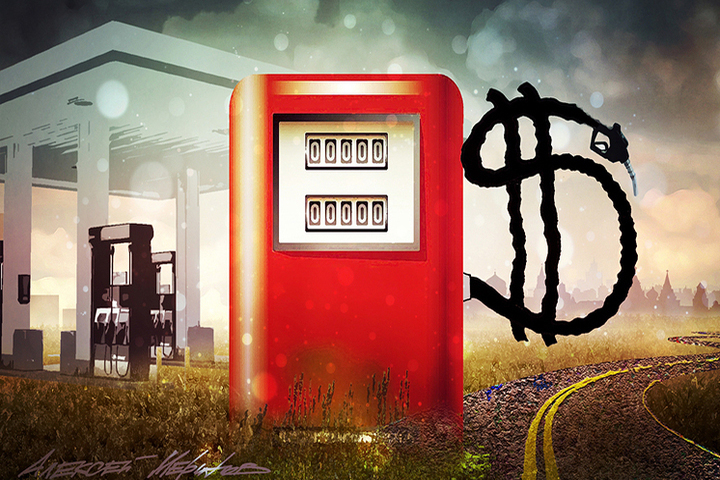Gasoline export will be banned from March 1: the measure was considered forced, but justified
[ad_1]

Economist Maslennikov: “We must be prepared for a sharp surge in demand for gasoline from car owners”
On March 1, a temporary ban on gasoline exports comes into force for a period of six months. The measure, approved by Prime Minister Mikhail Mishustin, does not apply to the already agreed volumes of supplies to the EAEU countries, Mongolia, Uzbekistan, Abkhazia and South Ossetia. According to analysts, it is due solely to seasonal factors – high demand for gasoline in the spring-summer period and planned repair work at refineries. Experts call this decision clearly forced and generally justified, but they warn that it also has side effects.
“In order to level out the rush demand for petroleum products, it is necessary to take measures to help stabilize prices on the domestic market,” Deputy Prime Minister Alexander Novak formulated the task in a letter addressed to Mishustin dated February 21. He justified his initiative with data from monitoring exchange prices. Since the beginning of 2024, the cost of AI-92 and AI-95 gasoline, as well as summer diesel fuel, has increased by 8–23%. At the same time, at gas stations the price of AI-92 and AI-95 decreased by 2 and 1 kopeck per liter, respectively, summer diesel fell in price by 7 kopecks, and the price of winter diesel remained at the same level. According to the Deputy Prime Minister, in such a situation it is necessary to increase the standards for trading petroleum products on the exchange and introduce a temporary ban on exports.
Today, to some extent (although not in such an acute form), last year’s history is repeating itself. In September 2023, the government banned the export of gasoline on an emergency basis due to the explosive increase in wholesale prices and the difficult situation with fuel supply for the harvesting campaign. In a number of regions, gas stations were closed due to losses. In addition, in the summer, the volume of transportation of petroleum products by rail in Russia doubled compared to 2022. Oil workers did not receive fuel on time, and they had to stand idle without sales.
The measure was repealed in November. The Ministry of Energy then reported that in two months a fuel surplus had formed on the domestic market, and the exchange price of AI-92 and AI-95 gasoline had decreased by 10-11%.
“The current decision certainly did not come as a surprise, since in January and February alone, different types of gasoline rose in price by 8-23%,” says Alexander Shneiderman, head of the sales and customer support department at Alfa-Forex. – And in the future, nothing foreshadowed a slowdown in dynamics: the sowing campaign will start soon, the holiday season will begin, and road trips around Russia are gaining popularity. At the largest refineries, scheduled maintenance work will be carried out in the spring and summer of 2024. Accordingly, urgent regulatory intervention is a justified and almost inevitable step. The government is counting on saturation of the domestic market by limiting the export of fuel for sale.”
Oil companies whose supply portfolio includes the EAEU countries, Uzbekistan, South Ossetia and Abkhazia will not be affected by the new rules. Exports will not stop. But gasoline suppliers to Georgia, Turkey, Brazil, Nigeria, UAE, and Tunisia will lose money. However, Shneiderman argues, due to the rapid turnover of the product within the country, losses will be minimal, especially given the temporary nature of the measure.
“The decision to ban exports was discussed by the government at the end of 2023, along with other options,” notes Nikita Maslennikov, leading expert at the Center for Political Technologies. “Then it was not yet clear how necessary it was in reality. Since then, several events have occurred, most notably a large-scale accident at the Nizhny Novgorod Oil Refinery. As a result, the period of traditional seasonal repair work there will stretch for several months, covering at least the entire second quarter. This means that the volume of petroleum products produced from these enterprises will decrease. This circumstance, along with a serious increase in stock prices, played a decisive role.”
According to MK’s interlocutor, in the context of repair work at the refinery, the measure should restore supply volumes, stabilize demand, and level out price dynamics. Another thing is that it does not systematically solve the problem of the eternal volatility of fuel prices. It is necessary to increase the oil refining rate and modernize refineries, and this is very expensive.
The fact is that gasoline price dynamics have pronounced seasonal volatility, associated both with weather conditions and with the necessary agricultural work. The state has to smooth out these peaks because, among other things, they are transferred to the logistics costs of retail chains and fuel inflation. The ban is justified, the only question is how long it will last in reality (formally – six months), and what lessons regulators will learn from this story for the future, Maslennikov argues. Now we need to calmly, without unnecessary stress, carry out the sowing campaign and be prepared for a sharp surge in demand for gasoline from car owners who become more active after the winter season and begin to travel to their dachas and around the country.
[ad_2]
Source link






